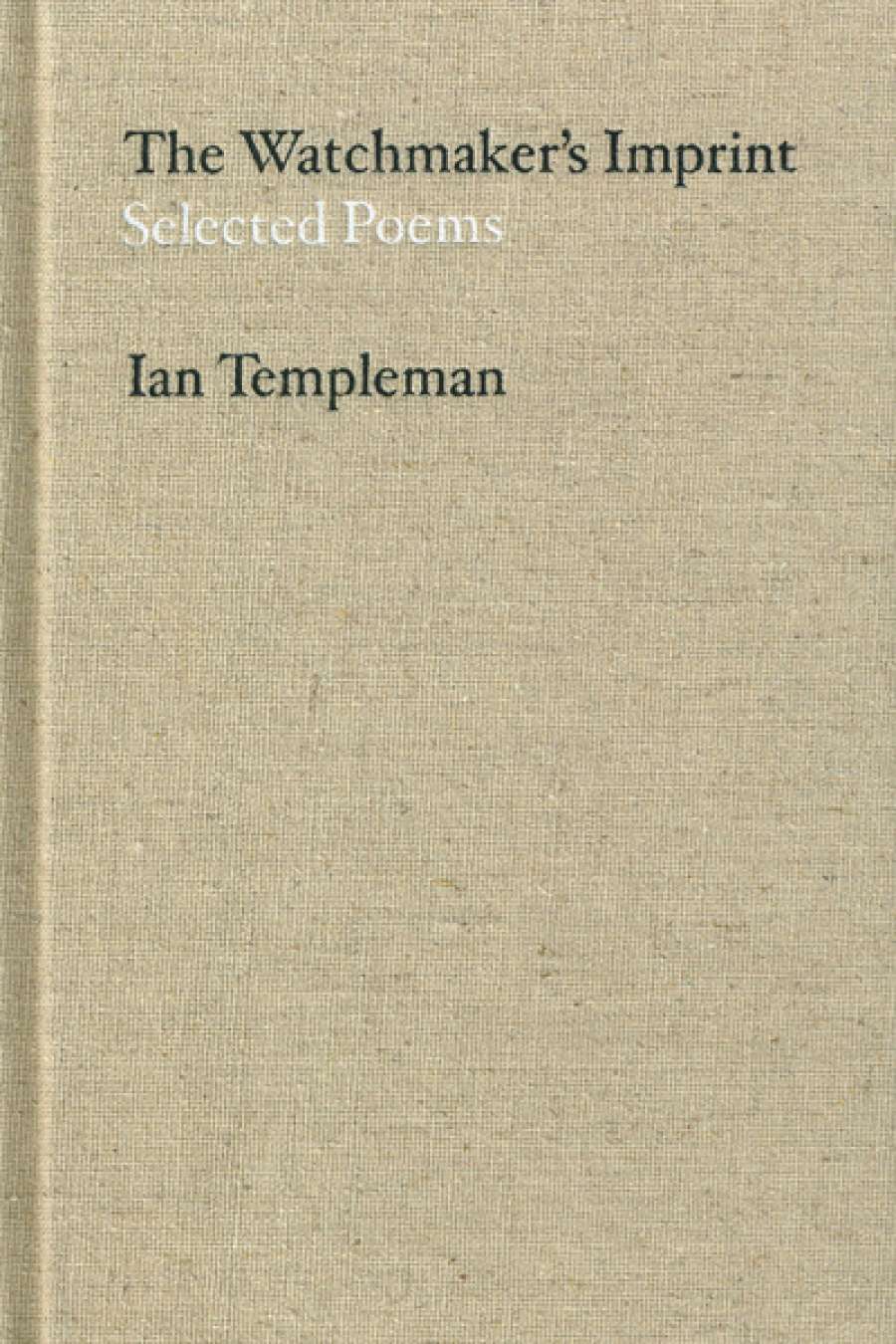
- Free Article: No
- Contents Category: Poetry
- Custom Article Title: Dennis Haskell reviews 'The Watchmaker's Imprint'
- Review Article: Yes
- Online Only: No
- Custom Highlight Text:
The last page of Ian Templeman’s Selected Poems asks us to imagine that ‘every touch / expressing affection, left a handprint / on the heart’ that scientists could later ‘analyse, / to trace a profile of love’. Templeman envisages retired scholars who would prefer to find these traces ‘above a life of research texts’. The poem is titled ‘Night Journey’ and the scholars are ‘Approaching the dark’. It establishes the scale of values by which Templeman assesses ‘life’s puzzle’, and he is surely right: intimacy, personal relationships, the links between the generations are in the end what really matter to us, above learning, knowledge, adventure, professional achievements, and ‘research texts’. The gentleness of this poem is characteristic, and it possesses added poignancy in this Selected because of circumstance. Templeman himself is seriously ill, and the selection has been made by fellow poets Paul Hetherington and Penelope Layland. The book, explicitly ‘a gift to the author’, includes a generous introduction and is superbly produced. It is as beautiful-looking a poetry book as I have ever seen, appropriate for a poet who has been deeply involved with the visual arts.
- Book 1 Title: The Watchmaker's Imprint: Selected Poems
- Book 1 Biblio: Tin Kettle Books, $30 hb, 88 pp, 9780646900346
Templeman’s book is full of handprints on the heart but he is not one to want them measurable. For all his valuing of intimacy, he prefers the privacy of the self to a life that could be ‘caged and questioned’ so his poetry exhibits a very Australian restraint rather than confessionalism. A poem for his sons warns them that attempts to ‘salvage / a biography’ will produce ‘only shadows’ of ‘a stranger’ who will ‘without answering vanish’. This poem is, like almost all Templeman’s poems, calm in tone, without any Camusian anguish about individual alienation. In part, the shadowiness derives from a sense of the inadequacy of language that is common among poets – after all, it is they who push language to its limits. Not that Templeman is a poet of linguistic extremes either – his work conforms to Peter Porter’s often misunderstood conception of poetry as ‘a modest art’. In a poem which I think concerns the death of Templeman’s first wife, he comes ‘to share your dying / above the river’ and in the abject helplessness that characterises such a visit:
I rub your fragile white wrist
between thumb and fingers, my
unhappiness
held within the iambic stress
of your breath …
The river is both an actual river and the metaphoric Styx, but the symbolism is quietly present rather than highlighted, and the poem ends with ‘an absence of love’s wordless acts, / interlocking fingers, a shared wistfulness’. Language, then, is not the measure of love, and a wistfulness that bespeaks sorrow is an Australian way of measuring grief that is reasonably characteristic of us and points to our English heritage. The Watchmaker’s Imprint continually works with the power of poignancy and restraint so that it requires close, careful reading.
The book’s title poem refers to the impact on the poet of Templeman’s father, a watchmaker and ‘army father’ who was away at war when Templeman was young. Templeman did come to know his father, but a certain tenuousness in the relationship never seems to have left the poet, and may have led to his sense of intergenerational unknowability. This delicate title poem, addressed to his father in old age, ends with Templeman declaring, ‘I am your bones, carry your name / and blindness in my blood. / We share a taste / for silence, the slow canter of bridled talk.’ Their conversations, Templeman recalls, ‘have always been of family, / never straying into the enclosure / of your imagination’. Templeman differs from his father in that the poems lead us into the realm of his imagination while the feeling of boundaries, enclosure, remains. In ‘The Bell Ringer’, a fine poem on death (his father’s, I presume), the word ‘bridled’ recurs when Templeman recalls his own childhood as ‘an only child indulged with bridled care’. It seems telling that the poem presents the death at one remove, through the tolling of a bell ‘until only weathered rhymes, / the bones, ashes and smell of love remain’. The poem is written in rhymed quatrains (a-b-a-b), the most common stanza in English, and shows how adept Templeman is with the form. It is the stanza form of Gray’s ‘Elegy’, the most famous in the language. When Templeman hears the knell of parting day ‘The bell toll tells our distance in more / than miles as life whispers on the lips / and affection is unexpressed as before’.
A Selected Poems is a survey, and The Watchmaker’s Imprint shows how much Templeman’s poetry improved as he went on. Some of his early poems try too hard to be poetic, and some are explicitly concerned with writing poems, a subject which inevitably tends to narcissism. His ‘Venetian Poems’ most obviously demonstrate his interest in art, and ultimately Templeman’s poetry is an art close to ordinary, in the sense of day to day, ‘happily suburban’ life. He is a ‘word bone and rag man’ using words to do what his watchmaker father did – attempt to repair ‘the intricacy of time’.


Comments powered by CComment